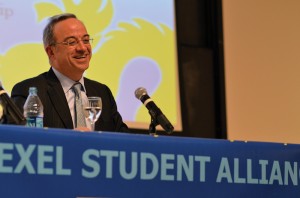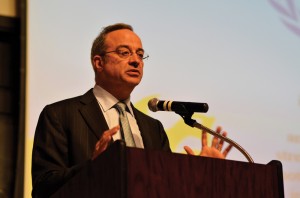The former deputy prime minister of Jordan referenced last year’s wave of revolutions in the Middle East during a discussion held April 10 at Drexel University and hosted by the Student Alliance of the United Nations Association of the USA.
Marwan Muasher, who is also the vice president for studies at the Carnegie Endowment for International Peace, spent an hour sharing his observations in the talk, which was titled “2011: A year of promise or peril for the Middle East?” He also took time to answer questions from the audience.
Muasher explained that he did not agree with the use of the term “Arab Spring” to describe the citizen-led protests in the Middle East last year because he believes that this title gives people the idea that the autocratic governments in the Middle East will fall quickly.
“I don’t see this process unfolding in months or even years,” he said, adding that although the process is slow, it is one that is necessary.
His own experiences in the Middle East played a large role in his discussion as well. Muasher served as the foreign minister and deputy prime minister of Jordan, and he opened Jordan’s first embassy in Israel as an ambassador. He also negotiated the first free-trade agreement between the United States and an Arab nation.
Muasher visited Tunisia in October 2011 during the country’s first democratic elections after its revolution. He went as part of an electoral observer mission for the National Democratic Institute. Currently he is a Middle East specialist for the Carnegie Endowment for International Peace, and he took a seat on the advisory council of The Hague Institute for Global Justice in 2011.
Muasher also said that for the countries whose governments have not yet begun to loosen their autocratic hold, “the longer they postpone the process, the more difficult reform will be.”
These are also the countries where people are most likely to take to the streets. Muasher explained that these protest movements have shown people that they can change their governments peacefully and, in many cases, without outside support.
He also discussed how political Islamists had previously been protected by autocracy. He explained that these groups could make unlimited promises to potential supporters because they did not have to keep them. The groups were also shielded from criticism because they were believed to be God’s self-appointed representatives on Earth.
“I believe that the Islamist support in the region has peaked,” he said.
According to Muasher, if these Islamist parties wish to participate in government, they must make themselves open to criticism and deliver on promises.
Muasher described some major requirements for creating a democratic state, even though each country’s situation is unique, and there is no single easy solution. According to Muasher, a country must have political pluralism that cannot be promised and then taken away by the people in charge.
He said he feels that the transformation should happen using peaceful means and the new government should be inclusive toward all minorities. Muasher thinks these countries should arrive at this goal by using reform processes that are written not only by the government but by the people as well. Finally, Muasher said that the process must have measurable steps so progress can be observed.
“You don’t really create democratic culture just with election,” he said.
Muasher also discussed the importance of creative learning being taught in schools. Students in the Middle East are taught based on rote learning. They often lack certain skills such as critical thinking, questioning information and scientific reasoning.
According to Muasher, there has been a lot of educational reform in recent years, but students are not being taught “the skills that are needed to maintain and renew a creative society.”
Muasher cautioned that many people may think that people in the Arab world have forgotten about Israel because these protest movements were not about Israel. He explained that this is not the case and that if peace is not achieved soon, it will not look good for Israel’s survival.
Despite this warning, Muasher said, “I am very optimistic in the long run.”
Though Muasher said that the role of the international community is to be supportive, he admitted that there is not much the international community can do to aid these countries. Pumping money into the situation will not really help, especially in an economic slump when many countries do not really have the money to spend.
Muasher finished the main lecture with a quote from Lisa Anderson, the president of the American University in Cairo, who said, “This group, the youth, were not revolting against their parents but revolting on behalf of their parents.”



